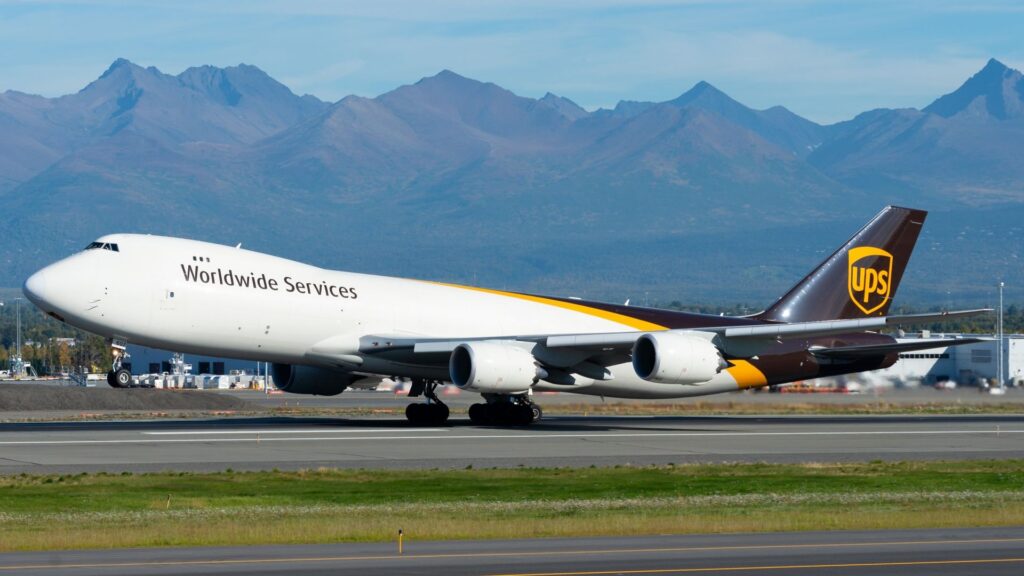
The Boeing 747, a legendary aircraft known for its distinctive hump and spacious design, continues to play a significant role in global logistics as it operates the longest nonstop cargo route in the world. This service connects Louisville Muhammad Ali International Airport (SDF) in the United States to Dubai World Central (Al Maktoum) Airport (DWC) in the United Arab Emirates. The flight, operated by UPS Airlines, covers approximately 7,700 miles (or 12,400 kilometers) and has a flight duration ranging from 13 to 14 hours, depending on wind conditions.
UPS Airlines’ Longest Route and Operations
UPS Airlines flight 76 serves as the flagship route for the cargo airline, connecting its primary hub at UPS Worldport to the bustling cargo airport in Dubai. The Boeing 747-8F, the latest variant of the 747 family, is particularly well-suited for this long-haul operation due to its extended range and considerable payload capacity. This aircraft can efficiently manage heavy-weight flights while offering high fuel efficiency, making it an ideal choice for transporting high-value cargo.
Flight tracking data from FlightAware indicates that the aircraft often follows a northeastern arc across the United States and Canada, entering the North Atlantic Organized Track System before navigating through European airspace. The route typically avoids Russian and Iranian airspace, reflecting the operational constraints that cargo airlines face in the region. UPS has developed specific routing strategies to account for these restrictions, ensuring timely deliveries while managing operational challenges.
The Boeing 747’s Role in UPS’s Fleet
UPS operates one of the largest active fleets of Boeing 747 freighters, maintaining 41 aircraft in service and two additional jets on standby. The average age of this fleet is approximately 11.5 years, with the 747-8F variant being the workhorse, consisting of 29 units in operation. These aircraft can carry around 135 tons of freight, making them invaluable for high-demand routes.
Historically, UPS has utilized earlier variants of the 747, including the 747-100 and 747-200. Over the years, the airline has operated nearly 70 Boeing 747 aircraft, adapting to the evolving demands of cargo transport. The 747-8F’s ability to perform long-distance flights efficiently has allowed UPS to maintain competitive operational economics, particularly during peak shipping seasons.
The 747’s design includes a nose-opening door and a large side door, enabling it to transport oversized cargo. This versatility is crucial for UPS, especially during busy periods when the capacity for additional packages is essential for meeting customer demands.
UPS’s operational network is centered around its hub in Louisville, which allows for streamlined logistics. The hub-and-spoke model reduces duplicate costs and enhances asset utilization, ensuring that the airline can effectively manage heavy maintenance and spare parts. While this centralized system can introduce concentration risks, such as delays from air traffic control issues, it significantly improves overall efficiency.
UPS deploys its Boeing 747 fleet extensively across its network, connecting Louisville to major hubs such as Cologne/Bonn (CGN) in Europe, as well as key cities in Asia, including Hong Kong, Shanghai, and Tokyo. The aircraft’s extended range allows for nonstop flights on many of these routes, which is a significant advantage for the airline.
As the aviation industry continues to evolve, the Boeing 747 remains a vital asset for cargo operations. While the aircraft’s role in passenger travel has diminished, its capabilities in freight transport ensure that it will continue to be a cornerstone of logistics for years to come. The ongoing use of the 747 in long-haul operations highlights its enduring legacy as one of the most effective freighters in the market today.







